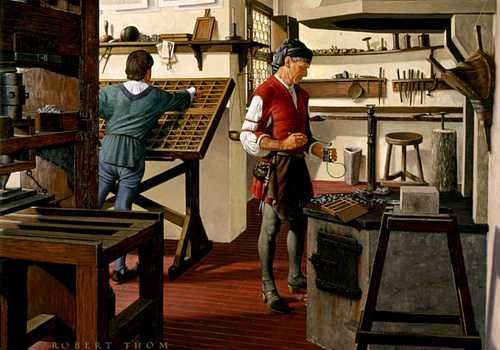A look into the story behind the printing press and the social revolution it caused!
Johannes Gutenberg and the Inner Workings of the Printing Press
Johannes Gutenberg is credited for inventing Europe’s first printing press. Surprisingly, Gutenberg had been working on the invention way back in 1436, even though the first book was only published in 1455. I guess he was forced to keep his secret hidden for a long time. After all, you can’t trust anyone in this business, not even your bestfriend (we’ll get to that later).
The first book Gutenberg published was the Bible, 180 copies of it to be precise. It was made using movable type, which involves letters cast on metal (sometimes in different sizes and fonts). These pieces can be moved around to achieve any combination of letters. The type would then be inked and pressed on paper through the use of the machine.

Image Source: https://en.wikipedia.org/wiki/File:Metal_movable_type.jpg
What I found most interesting about this is the amount of work that would have gone into creating every piece of metal, letter, size, font, etc. Although Gutenberg was the major contributor to this method of printing, I believe it’s important to acknowledge the hard work and dedication of all those workers who made this invention a success.

Image Source: https://todayinsci.com/G/Gutenberg_Johannes/LifeGreatInventors-Gutenberg.htm
Revolutions and Reverberations
The Impact of Gutenberg’s Printing Press went far beyond the realm of books. It created an entire social revolution in every field imaginable. Before, scribes would have to copy down word for word to create a book. As a result, books were expensive and only accessible to an elite few. Now, with the ability to print so many books in less time, the costs went down. Public libraries emerged everywhere and normal folks started reading! Experts in different fields published their own books/scientific data and communicated with one another, despite the distance separating them. Even Copernicus’s heliocentric model was published! One can surely imagine just how much this would have spurred the Scientific Revolution. I mean, what’s the point of such knowledge if it can’t be shared? Moreover, ancient texts were recovered, Martin Luther’s Ninety-Five Thesis sold out (led to the Protestant Reformation) and ideas of the Renaissance and secularity spread! Imagine if all these events had not happened. Our world as we know it would have surely differed.
Betrayal and Downfall
With such a game changing invention, one would think Gutenberg would have gotten incredibly rich. Alas, he ended up in bankruptcy. It all started when Gutenberg met Johannes Fust. Gutenberg needed money to launch his printing press, and Fust was a rich lawyer. With the help of his money, things were going well and Gutenberg was on the verge of publishing the Bible. However, Fust betrayed him right before that and sued him. He then partnered up with Gutenberg’s best friend, Peter Schoeffer, who knew all about the inner workings of the printing press. Together, they took all the credit for Gutenberg’s work and became very rich because of it. Although Gutenberg died poor, his invention was a significant contribution to society. The impact of it reverberates to this day. Just imagine how isolated our world would be without the press!

Image Sources: https://en.wikipedia.org/wiki/Johann_Fust
https://fineartamerica.com/featured/peter-schoffer-german-printer-mary-evans-picture-library.html
Sources:
https://www.britannica.com/biography/Johannes-Gutenberg
https://www.merriam-webster.com/dictionary/movable%20type
https://en.wikipedia.org/wiki/File:Metal_movable_type.jpg
https://todayinsci.com/G/Gutenberg_Johannes/LifeGreatInventors-Gutenberg.htm
https://www.history.com/news/printing-press-renaissance
https://www.livescience.com/2569-gutenberg-changed-world.html
https://www.thegreatcoursesdaily.com/the-social-impact-of-the-printing-press/
https://en.wikipedia.org/wiki/Johannes_Gutenberg#Legacy
https://www.psprint.com/resources/printing-press/
https://theweek.com/articles/454295/johannes-gutenberg-15thcentury-con-man
https://en.wikipedia.org/wiki/Johann_Fust
https://fineartamerica.com/featured/peter-schoffer-german-printer-mary-evans-picture-library.html
Leave a Reply